 |
| Pix Credit here |
Members of the Standing Committee are elected every five years. In 2012, the newly elected members of the Standing Committee of the Political Bureau of the 18th CPC Central Committee paid their first trip to an exhibition titled "The Road Toward Rejuvenation." In 2017, the freshly elected members of the Standing Committee of the Political Bureau of the 19th CPC Central Committee paid their first visit to the site where the first CPC National Congress was held in 1921. . . . Less than a week after the conclusion of the 20th National Congress of the Communist Party of China (CPC), Xi Jinping, general secretary of the CPC Central Committee, president of the People's Republic of China, and chairman of the Central Military Commission, led the members of the Standing Committee of the CPC Central Committee Political Bureau to visit Yan'an, an old revolutionary base in northwest China's Shaanxi Province. (The first visit of the Party's leaders after the 20th CPC National Congress)
I suggested earlier that the most profound element of the 20th National CPC Congress was to bring the Party (and the nation now) back to the spirit of Yan'an (see discussion here). The CPC core of leadership underscored this in their choice for their first visit after the end of the 20th Congress.
It is important to recall the essence of Yan'an, extracted both from the problem of personal leadership, and the ideological instruments through which these battles were fought. And then the irony, the battleground of ideology eventually consumed and transcended the personalities that unleashed it.
Mao's Rectification Movement was aimed to attack two types of influence within the Party: the Stalin-style influence from the Russian trained intellectuals on the one hand, and the Western democratic liberalism among the May Fourth generation on the other. . . . How could Mao, who exercised little influence on either group win over the entire Party? Mao's solution was to create a brand new Maoist culture--a culture that was comprised of an entire set of concepts, models, and discourses--and in fact a culture that was later instilled into the Party and became an institution of the Party. (Kan Liang, 'The Rise of Mao and His Cultural Legacy: The Yan'an Rectification Movement (2003 12(34) Journal of Contemporary China 225-228, 225.26; reviewing Gao Hua, Hong taiyang shi zenyang qi de: Yan'an zhengfeng yandong de lailangqumai The Chinese UNiversity Press, 2000). m )
The sprint of Yan'an takes different form in different eras, though its recourse to the language of ideology--and the control of its vocabulary and meaning--remains very much the same, as does the object of recertification. For this New Era, the object of rectification again comes in two forms--on the one side the democratic liberalism of some of the intelligentsia and the leading forces of markets driven private development; on the other the technocratic elites that saw political philosophy as an impediment to the realization of socialist modernization measures in terms of wealth production and most recently centered in the Communist Youth League. What was required was an ideological language that captured the spirit of the times to refashion the discursive tropes of Chinese Leninism to break the power of both.
The solution was as elegantly simple as it was effective. Its foundations were built on the necessity to put the party back in the center; a standard CPC position for many years. What changed was the meanings and political culture within which that concept would be understood and applied. That change, in turn, require putting political philosophy at the center of the means by which new understanding Party centering could be accomplished. It then produced a forward movement of ideology to capture the spirit of centering--the core of which now from the essence of New Era Thought, and the geographies of nation al rejuvenation, the principal contradiction of better distribution, the morality of socialist modernization, and the aligning of state, party, social, economic, cultural, political, and civil ideals..
At the core of the New Era innovations were what might be understood as an updating of the core innovations from the Yan'an period. Both were undertaken in an atmosphere of crisis--in 1942 the double battlefields of invasion and civil war; in 2022 the double threats of the corruption of the Reform and Opening Up period and the threat from the liberal democratic camp manifested in decoupling ( (二十大受权发布)习近平指出,新时代十年的伟大变革具有里程碑意). Perhaps the greatest innovation of New Era Thought was the elaboration of its premise of the foundational importance of the core-collective binary (the core guiding the collective) as the critical building block of nation and Party: with the Central Committee as the core of the CPC, and the Politburo at the core of the core of the Central Committee, and its standing committee at the Politburo's core, and at the center--the secretary general. Around these relationships--New Era reiterations of democratic centralism, of the mass line, and of the people's democratic dictatorship. Around the core a series of spokes and rings--besides those of the CPC, there are those of whole process democracy, of one country two systems, and of the cage of regulations built into and through the state apparatus. ( 习近平强调,坚定不移全面从严治党,深入推进新时代党的建设新的伟大工程 ).
习近平在瞻仰延安革命纪念地时强调 弘扬伟大建党精神和延安精神 为实现党的二十大提出的目标任务而团结奋斗 [When paying tribute to the Yan'an Revolutionary Memorial Site, Xi Jinping emphasized to carry forward the great spirit of founding the party and the spirit of Yan'an, and to unite and strive for the realization of the goals and tasks put forward by the 20th National Congress of the Communist Party of China] follows in the original Chinese and in a translation provided by Ginger Rver Review ((Jiang Jiang and Jinglin Gao (trans) with notes).
新华社延安10月27日电 党的二十大闭幕不到一周,中共中央总书记、国家主席、中央军委主席习近平带领中共中央政治局常委李强、赵乐际、王沪宁、蔡奇、丁薛祥、李希,专程从北京前往陕西延安,瞻仰延安革命纪念地,重温革命战争时期党中央在延安的峥嵘岁月,缅怀老一辈革命家的丰功伟绩,宣示新一届中央领导集体赓续红色血脉、传承奋斗精神,在新的赶考之路上向历史和人民交出新的优异答卷的坚定信念。习近平强调,要弘扬伟大建党精神,弘扬延安精神,坚定历史自信,增强历史主动,发扬斗争精神,为实现党的二十大提出的目标任务而团结奋斗。

10月27日,中共中央总书记、国家主席、中央军委主席习近平带领中共中央政治局常委李强、赵乐际、王沪宁、蔡奇、丁薛祥、李希,瞻仰延安革命纪念地。这是习近平等在延安革命纪念馆,参观《伟大历程——中共中央在延安十三年历史陈列》。 新华社记者 王晔 摄
27日上午,习近平等集体乘车,来到位于延安城西北的杨家岭革命旧址。1938年11月,中共中央机关由凤凰山迁到杨家岭。在杨家岭期间,我们党召开了第七次全国代表大会,开展了延安整风运动,领导了中国人民抗日战争。

10月27日,中共中央总书记、国家主席、中央军委主席习近平带领中共中央政治局常委李强、赵乐际、王沪宁、蔡奇、丁薛祥、李希,瞻仰延安革命纪念地。这是习近平在杨家岭瞻仰中共七大会址。 新华社记者 燕雁 摄
习近平等首先来到中共七大会址。1945年4月至6月党的七大在这里召开。我们党成立时只有50多名党员,到党的七大召开时已经拥有了121万名党员。习近平缓步瞻仰会场,他表示,党的七大在党的历史上具有重要里程碑意义,标志着我们党在政治上思想上组织上走向了成熟。在政治上,党通过延安整风,使全党团结在毛泽东的旗帜下,实现了党的空前统一和团结。在思想上,党确立了毛泽东思想在全党的指导地位,把毛泽东思想写入了党章。在组织上,党形成了一支高举毛泽东旗帜的久经考验的政治家集团。党的七大在党的历史上具有极其重要的地位,为党后来不断从胜利走向胜利指明了正确方向、开辟了正确道路。

10月27日,中共中央总书记、国家主席、中央军委主席习近平带领中共中央政治局常委李强、赵乐际、王沪宁、蔡奇、丁薛祥、李希,瞻仰延安革命纪念地。这是习近平等在杨家岭参观毛泽东旧居。 新华社记者 鞠鹏 摄
随后,习近平等来到毛泽东等老一辈革命家旧居,重温老一辈革命家在杨家岭的革命经历,了解革命旧址保护情况。在延安时期,杨家岭是毛泽东居住时间最长的地方,著名的“窑洞对”就是在这里进行的。“窑洞对”的要义,是回答如何跳出治乱兴衰历史周期率、避免人亡政息、确保政权长期存在的问题。在“窑洞对”中,毛泽东同志给出了第一个答案,这就是让人民监督政府。党的十八大以来,以习近平同志为核心的党中央在全面从严治党的实践中给出了第二个答案,这就是党的自我革命。习近平指出,延安革命旧址见证了我们党在延安时期领导中国革命、探索马克思主义中国化时代化的光辉历程,是一本永远读不完的书,每次来都温故而知新,受到深刻教育和启示。要管理好、研究好,结合现实讲好杨家岭的故事、讲好党的七大的故事。

10月27日,中共中央总书记、国家主席、中央军委主席习近平带领中共中央政治局常委李强、赵乐际、王沪宁、蔡奇、丁薛祥、李希,瞻仰延安革命纪念地。这是习近平等在杨家岭参观朱德旧居。 新华社记者 燕雁 摄
讲解员介绍了当年陕北人民在民歌《白马调》基础上创作和传唱歌曲《东方红》的过程,并现场作了演唱。习近平指出,这些歌颂党、歌颂毛主席的文艺作品都是人民群众自发创作的,充分说明人民选择了毛泽东,人民拥戴毛泽东。
随后,习近平等集体乘车前往延安革命纪念馆,参观《伟大历程——中共中央在延安十三年历史陈列》。

10月27日,中共中央总书记、国家主席、中央军委主席习近平带领中共中央政治局常委李强、赵乐际、王沪宁、蔡奇、丁薛祥、李希,瞻仰延安革命纪念地。这是习近平等在延安革命纪念馆,参观《伟大历程——中共中央在延安十三年历史陈列》。 新华社记者 鞠鹏 摄
从1935年到1948年,以延安为中心的陕甘宁边区是中共中央所在地,是中国人民抗日战争的政治指导中心和中国人民解放斗争的总后方。展览全面系统展示了党中央和毛泽东等老一辈革命家把马克思主义基本原理同中国革命具体实践相结合、在延安领导全国革命走向胜利的光辉历史。习近平等依次参观了“中共中央和红军长征的落脚点”、“中国人民抗日战争的政治指导中心”、“创建新民主主义的模范试验区”、“夺取全国胜利的出发点”、“延安精神永放光芒”等展览内容。习近平不时驻足观看,同大家一起缅怀党中央在延安时期的峥嵘岁月。

10月27日,中共中央总书记、国家主席、中央军委主席习近平带领中共中央政治局常委李强、赵乐际、王沪宁、蔡奇、丁薛祥、李希,瞻仰延安革命纪念地。这是习近平等在延安革命纪念馆,参观《伟大历程——中共中央在延安十三年历史陈列》。 新华社记者 燕雁 摄
参观结束时,习近平发表重要讲话。他表示,延安是中国革命的圣地、新中国的摇篮。从1935年到1948年,党中央和毛泽东等老一辈革命家在延安生活和战斗了13年,领导中国革命事业从低潮走向高潮、实现历史性转折,扭转了中国前途命运。巍巍宝塔山,滚滚延河水。延安用五谷杂粮滋养了中国共产党发展壮大,支持了中国革命走向胜利。延安和延安人民为中国革命事业作出了巨大贡献,我们要永远铭记。
习近平满怀深情地说,我在延安地区生活劳动了7年,我的父辈也是从这里走出去的,我对这里十分熟悉。当年在陕北插队的时候,每次路过延安,我都要来七大会址、杨家岭、枣园、凤凰山等革命旧址看一看。到中央工作后,先后3次来延安考察调研。这次和中央政治局常委同志一起来,就是要宣示新一届中央领导集体将继承和发扬延安时期党形成的优良革命传统和作风,弘扬延安精神。
习近平强调,在延安时期形成和发扬的光荣传统和优良作风,培育形成的以坚定正确的政治方向、解放思想实事求是的思想路线、全心全意为人民服务的根本宗旨、自力更生艰苦奋斗的创业精神为主要内容的延安精神,是党的宝贵精神财富,要代代传承下去。
习近平指出,坚定正确的政治方向是延安精神的精髓。1938年,毛泽东同志在延安抗日军政大学回答“在抗大应当学习什么”时指出,“首先是学一个政治方向”。全党同志要坚持正确政治方向,坚决贯彻党的基本理论、基本路线、基本方略,坚决落实党中央决策部署,把老一辈革命家开创的伟大事业继续推向前进。

10月27日,中共中央总书记、国家主席、中央军委主席习近平带领中共中央政治局常委李强、赵乐际、王沪宁、蔡奇、丁薛祥、李希,瞻仰延安革命纪念地。这是习近平在延安革命纪念馆参观《伟大历程——中共中央在延安十三年历史陈列》结束时发表重要讲话。 新华社记者 燕雁 摄
习近平强调,延安时期,党提出全心全意为人民服务的根本宗旨并写入党章,强调共产党“这个队伍完全是为着解放人民的,是彻底地为人民的利益工作的”,要求党的干部“把屁股端端地坐在老百姓的这一面”,形成了“只见公仆不见官”的生动局面。全党同志要站稳人民立场,践行党的宗旨,贯彻党的群众路线,保持党同人民群众的血肉联系,自觉把以人民为中心的发展思想贯穿到各项工作之中,扎实推进共同富裕,让现代化建设成果更多更公平惠及全体人民。
习近平指出,党中央和红军安家延安后,由于敌人的军事包围和经济封锁,条件十分艰苦。延安军民积极响应毛泽东同志发出的“自己动手、丰衣足食”号召,开展了热火朝天的大生产运动,有力支持了抗日前线。全党同志要大力弘扬自力更生、艰苦奋斗精神,无论我们将来物质生活多么丰富,自力更生、艰苦奋斗的精神一定不能丢,脚踏实地、苦干实干,集中精力办好自己的事情,把国家和民族发展放在自己力量的基点上。
习近平强调,当年毛泽东同志等老一辈革命家在延安,住窑洞、吃粗粮、穿布衣,用“延安作风”打败了“西安作风”。全党同志要把老一辈革命家和共产党人留下的光荣传统和优良作风传承好发扬好,勇于推进党的自我革命,坚定不移推进全面从严治党,始终保持党的先进性和纯洁性,确保党始终成为中国特色社会主义事业的坚强领导核心。
习近平指出,延安时期,党以顽强的斗争精神和高超的斗争本领,有力开展了抗击日本军国主义侵略的斗争,有力应对了西安事变、七七事变、重庆谈判等一系列重大挑战,有力领导和指挥了全国革命斗争,有力应对了国民党军队对陕甘宁边区的重点进攻,靠小米加步枪打开了中国革命新局面。全党同志要发扬斗争精神、提高斗争本领,坚决战胜前进道路上的各种困难和挑战,依靠顽强斗争打开事业发展新天地。
习近平强调,党的二十大制定了当前和今后一个时期党和国家的大政方针,描绘了以中国式现代化全面推进中华民族伟大复兴的宏伟蓝图。让我们踏上新征程,向着新的奋斗目标,出发!
临行时,习近平同在场的老党员以及老红军、老八路、烈士后代,党校干部学院教师及纪念馆工作人员等亲切交流,勉励大家弘扬革命精神,讲好党的故事,激励人们坚定不移听党话、跟党走,为实现中华民族伟大复兴中国梦而不懈奋斗。现场响起长时间热烈的掌声。
刘国中、陈希和中央有关部门负责同志,陕西省有关负责同志参加上述活动。
[When paying tribute to the Yan'an Revolutionary Memorial Site, Xi
Jinping emphasized to carry forward the great spirit of founding the
party and the spirit of Yan'an, and to unite and strive for the
realization of the goals and tasks put forward by the 20th National
Congress of the Communist Party of China] (Jiang Jiang and Jinglin Gao (trans) with notes)
Less than a week after the conclusion of the 20th National Congress of the Communist Party of China (CPC), Xi Jinping, general secretary of the CPC Central Committee, president of the People's Republic of China, and chairman of the Central Military Commission, led the members of the Standing Committee of the CPC Central Committee Political Bureau to visit Yan'an, an old revolutionary base in northwest China's Shaanxi Province. The members are Li Qiang, Zhao Leji, Wang Huning, Cai Qi, Ding Xuexiang and Li Xi. They were there to pay tribute to this sacred land of the Chinese revolution, review the eventful days of the Party Central Committee in Yan'an in the years of the revolutionary war, commemorate the great achievements made by revolutionaries of the older generation, and manifest the conviction of the new central leadership to carry forward the Party's revolutionary legacy and fighting spirit and present an excellent answer sheet to the people and posterity with new achievements on the road ahead. Xi stressed that we will carry forward the great founding spirit of the Party, the Yan'an Spirit, and our fighting spirit, remain confident in our history, and exhibit greater historical initiative to strive in unity for the fulfillment of the objectives and tasks set forth at the 20th CPC National Congress. [Note: It reminded Ginger River of what Xi said at a ceremony marking the centenary of the CPC on July 1, 2021 (Downloadable) -- "Though our Party's founding mission is easy to define, ensuring that we stay true to this mission is a more difficult task. By learning from history, we can understand why powers rise and fall. Through the mirror of history, we can find where we currently stand and gain foresight into the future. "]
On the morning of October 27, Xi Jinping and the others arrived at the revolutionary site of Yangjialing in northwest Yan'an. In November of 1938, all departments of the CPC Central Committee moved from Fenghuang Hill to Yangjialing, where the CPC held its Seventh National Congress, launched the Yan'an Rectification Movement, and led the Chinese people in the War of Resistance Against Japanese Aggression.
The first picture is a photo of the Seventh CPC National Congress (from documents), and the second picture was taken on Oct. 27, 2022, at the Yangjialing Revolutionary Site in Yan'an, where the congress was held. (source: Xinhua)
Xi and the others first visited the site of the Seventh CPC National Congress, which was held from April to June in 1945. [Note: The Seventh CPC National Congress was convened at the Central Auditorium in Yangjialing. The meeting was monumental in CPC history. Representing 1.21 million Party members in China, 547 official delegates and 208 alternate delegates attended the congress. It was the first time that CPC held a national congress in a house built on its own. (source: Xinhua) ]
There were only over 50 members when our Party was founded. By the time of the Seventh CPC National Congress, this number had increased to 1.21 million. Xi Jinping walked slowly to pay his tribute to the site, and said that the Seventh CPC National Congress marked a major milestone in the history of our Party, suggesting that our Party was becoming increasingly mature as far as its political direction, ideology and organizational structure were concerned.
Politically, after the Yan'an Rectification Movement, the whole Party was united together under the guidance of Comrade Mao Zedong, realizing unprecedented unity and solidarity within our Party. [Note: The Seventh CPC National Congress in 1945 established Mao Zedong Thought as a guiding thought of the Party and incorporated it into the CPC's Constitution. Later on, the constitution was amended multiple times. The latest version was deliberated and adopted at the 20th CPC National Congress on Oct. 22. GRR has created a document titled "What did the Party do to its Constitution?" with every single change made (compared with the version in 2017) being marked for you to download and share. In addition, https://www.12371.cn/ (the website of CPC members) compiled a summary, collecting different versions of the CPC in chronological order and a very brief takeway of each amendment. ] Ideologically, the Party established the guiding role of Mao Zedong Thought in the whole Party and enshrined it in the Party Constitution. Organizationally, our Party formed a group of time-tested statesmen who held high the banner of Mao Zedong. The Seventh CPC National Congress played an incredibly important role in the history of our Party, pointing out the right direction and charting the correct course for our Party in achieving one victory after another ever since.
On Thursday, the auditorium was set as the original setting of the Seventh CPC National Congress. Above the podium hangs the political slogan of the congress, "March successfully under the banner of Mao Zedong" 在毛泽东的旗帜下胜利前进. On the wall of the auditorium hangs the theme of the congress written by Mao, "One heart one mind" 同心同德. (source: Xinhua)
Party leaders including General Secretary Xi Jinping visited the Yan'an Revolutionary Hall for the exhibition Great Journey —— Thirteen years of the Communist Party of China (CPC) Central Committee in Yan'an on display 《伟大历程——中共中央在延安十三年历史陈列》. (source: Xinhua)
Then, they arrived at the former residences of Mao Zedong and other revolutionaries of the older generation, where they recalled stories of those revolutionaries at Yangjialing and learned about how these revolutionary sites had been protected. During the Yan'an Period (1935-1948), Mao stayed at Yangjialing for the longest time, where the well-known "cave-dwelling conversation" with acclaimed patriot and educationist Huang Yanpei happened. [Note: On the eve of the victory of the War of Resistance Against Japanese Aggression, two possible routes were in front of China. At the beginning of July 1945, 黄炎培 Huang Yanpei flew to Yan'an from Chongqing for a visit. Though Huang saw the vitality of the CPC in Yan'an, he was also worried about whether this vitality could be maintained for long. His conversation with Mao, later became the famous "窑洞对" Yan'an cave-dwelling conversation. Check GRR's previous post on the conversation: 101st Year Anniversary, Mao's Cave-Dwelling Dialogue, and Historical Cycles] The conversation was mainly about how to escape the historical cycle of rise and fall, how to avert the possibility of a government's policies ending with the death of its leader, and ultimately how a political power can maintain long-lasting successful governance. Mao had offered the first answer to the question -- placing the government under the supervision of the people. With the practice of full and rigorous Party self-governance since the 18th CPC National Congress, the Party Central Committee with Comrade Xi Jinping at its core has provided the second answer -- carrying out Party's self-reform. Xi noted that the revolutionary sites had witnessed a glorious journey our Party had traveled during the Yan'an Period when it led the Chinese revolution and struggled to adapt Marxism to the Chinese context and the needs of that era. The revolutionary sites are like a book that is worth reading all the time, said Xi, adding that each time he came here to visit the sites, he was struck with new insight and great inspiration. He urged solid efforts to improve the management of these sites and thoroughly study their revolutionary past so as to better tell the stories of Yangjialing and of the Seventh CPC National Congress in combination with reality.
A docent introduced how people in northern Shaanxi composed the song The East Is Red 《东方红》based on the folksong of Baimadiao《白马调》and sang it for the leaders. Xi pointed it out that the works of literature and art in praise of the Party and Chairman Mao were all voluntarily created by the people, which fully demonstrated that Mao was chosen by the people and supported by the people.
They then traveled to Yan'an Revolutionary Memorial Hall and visited an exhibition titled The Great Journey -- CPC Central Committee's 13 Years in Yan'an.
From 1935 to 1948, the Shaanxi-Gansu-Ningxia Border Region centered around Yan'an was where the CPC Central Committee headquartered. It also served as the political guidance center for the Chinese People's War of Resistance Against Japanese Aggression as well as the general rear area for the Chinese People's War of Liberation. In a comprehensive and systematic manner, the exhibition presented the glorious history of how the CPC Central Committee and revolutionaries of the older generation including Mao Zedong led the Chinese revolution to success from Yan'an through adapting the basic tenets of Marxism to the specific practices of the Chinese revolution. Xi and the others visited the exhibition chapters "the Foothold of the CPC Central Committee and the Red Army during the Long March", "the Center of Political Guidance for the Chinese People's War of Resistance Against Japanese Aggression", "the Model Pilot Zone of New Democracy", "the Point of Departure for Winning the National Victory", "the Lasting Glory of Yan'an Spirit", and other chapters. Xi would once in a while stop to watch a particular exhibit and reminisce with everyone at presence about the extraordinary years of the CPC Central Committee in Yan'an.
Xi delivered an important speech at the end of the visit. He said that Yan'an is a sacred place of the Chinese revolution and the cradle of New China. The CPC Central Committee and revolutionaries of the older generation, including Mao Zedong, lived and struggled in Yan'an for 13 years from 1935 to 1948. There, under the leadership of the CPC Central Committee and revolutionaries of the older generation including Mao Zedong, the revolutionary cause developed from its low tide to high tide and realized its historic transition, thus turning the tables when it came to China's future and destiny. The towering Baota Mountain and rolling Yanhe River have witnessed the great endeavors. Yan'an, with all kinds of food grain, nourished the development of the CPC in strength, and supported the victory of the Chinese revolution. Yan'an and its people have made tremendous contribution to the victory of the Chinese revolution, which we should never forget, Xi said.
"I have lived and worked in Yan'an for seven years," Xi said affectionately. "My elder generation also once lived here, and I am quite familiar with the region. When I was sent to northern Shaanxi and worked in the fields as a farmer, every time I got a chance to come to Yan'an, I would visit those revolutionary sites, including the site of the Seventh CPC National Congress, Yangjialing, Zaoyuan and Fenghuang Hill. After working in the CPC Central Committee, I've paid three inspection tours here," he said. "This time, with members of the Standing Committee of the Political Bureau of the CPC Central Committee, I come here to manifest that the new central leadership will inherit and carry forward the glorious traditions and fine work styles of the Party cultivated during the Yan'an Period, and carry forward the Yan'an Spirit," Xi said.
He stressed, the glorious traditions and fine conduct of the CPC cultivated and carried forward during the years in Yan'an, and the Yan'an Spirit characterized by firm and correct political direction, ideological line of emancipating the mind and seeking truth from facts, the principle of serving the people wholeheartedly, and the style of self-reliance and hard work, are an invaluable source of inspiration for the Party, and should be passed down from generation to generation.
Xi noted, the firm and correct political direction was the essence of the Yan'an Spirit. In 1938, when replying to the question "What should be learned at the Military and Political University of Resistance Against Japanese Aggression in Yan'an", Comrade Mao Zedong pointed out, "First and foremost, we need to learn about a political direction". All Party members must adhere to the correct political direction, resolutely implement the Party's basic theory, line, and policy, thoroughly implement the Party Central Committee's decisions and plans, so as to further advance the great cause pioneered by revolutionaries of the older generation.
Xi Jinping delivers an important speech after visiting the exhibition on the 13 years of the Communist Party of China (CPC) Central Committee in Yan'an. (source: Xinhua)
Xi stressed, during the Yan'an Period, our Party put forward the fundamental principle of serving the people wholeheartedly and wrote it into the Party Constitution, emphasizing that "the contingent of the CPC was established for the liberation of the people and always stood ready to work for their interests", and requiring all Party officials to "stand firmly at the side of ordinary people", and thus bringing about a vivid picture in which "officials were all public servants in people's eyes". All Party members must stand firmly with the people, act on the Party's purpose, put into practice the mass line, maintain close ties with the people, take the initiative to apply the people-centered development philosophy to all work, and achieve solid progress in promoting common prosperity, so that the people share more fully and fairly in the gains of modernization.
Xi noted, after settling down in Yan'an, the Party Central Committee and the Red Army faced extremely tough conditions due to the enemy's military encirclement and economic blockade. Soldiers and civilians in Yan'an had enthusiastically responded to Comrade Mao Zedong's call of "drawing on our own labor to supply ourselves with adequate food and clothing" and started an enthusiastic production campaign, which provided crucial support for the frontline in the war against Japanese aggression. Each and every Party member must carry forward the spirit of self-reliance and hard work, which shall never be repudiated no matter how well-off we become in the future, and they should also work hard in a down-to-earth and practical manner to concentrate on managing our own affairs well and support the development of our country and our nation with our own strength.
Xi stressed that, back in the days in Yan'an, Comrade Mao Zedong and other revolutionaries of the older generation lived in cave-dwellings, eating coarse grain for meals and wearing rough clothes. This "Yan'an conduct" defeated the "Xi'an conduct." All Party members should carry forward the glorious traditions and fine conduct of revolutionaries of the older generation and Chinese Communists, advance the Party's self-reform with courage, resolutely exercise full and rigorous self-governance of the Party, and always maintain our Party's advanced nature and integrity, enabling our Party to always remain the strong leadership core in the cause of building socialism with Chinese characteristics.
Xi pointed out that during the Yan'an Period, the Party, with tenacious fighting spirit and exceptional fighting ability, had effectively carried out struggles against Japanese militarist aggression, and effectively responded to a series of major challenges such as the Xi'an Incident, the July Seventh Incident and the Chongqing Negotiations. Also, the Party had effectively led and commanded the revolutionary struggles nationwide and effectively tackled the targeted attacks by the Kuomintang-led forces on the Shaanxi-Gansu-Ningxia Border Region. With merely "millet plus rifles," the Party had opened up new prospect for the Chinese revolution. The whole Party should carry forward such fighting spirit, improve fighting ability, resolutely surmount all difficulties and challenges on the road ahead and harness our indomitable fighting spirit to open up new horizons for our cause.
Xi stressed that the Party's 20th National Congress had set forth major principles and policies for the Party and the country at present and for some time to come, and drawn up a splendid blueprint of promoting national rejuvenation through a Chinese path to modernization. Let us embark on the new journey, and set out toward our new goal! [Note: GRR collected many essential official documents from the 20th CPC National Congress, including the report of the 19th Central Committee of the CPC which was adopted at the recently concluded 20th CPC National Congress, in a previous post. You can click the links in the post to download or read them.]
Before he left, Xi had cordial talks with some veterans of the Red Army and the Eighth Route Army, descendants of revolutionary martyrs, local Party School and cadre college teachers and staff members of the memorial. He encouraged them to promote revolutionary spirit, tell well stories of the Party, so as to inspire people to steadfastly follow the Party and its guidance, and strive unremittingly to realize the Chinese Dream of great national rejuvenation. Lasting and loud applause rose at the site.
Liu Guozhong, Chen Xi, and leading officials of relevant central authorities and Shaanxi Province took part in the activities.

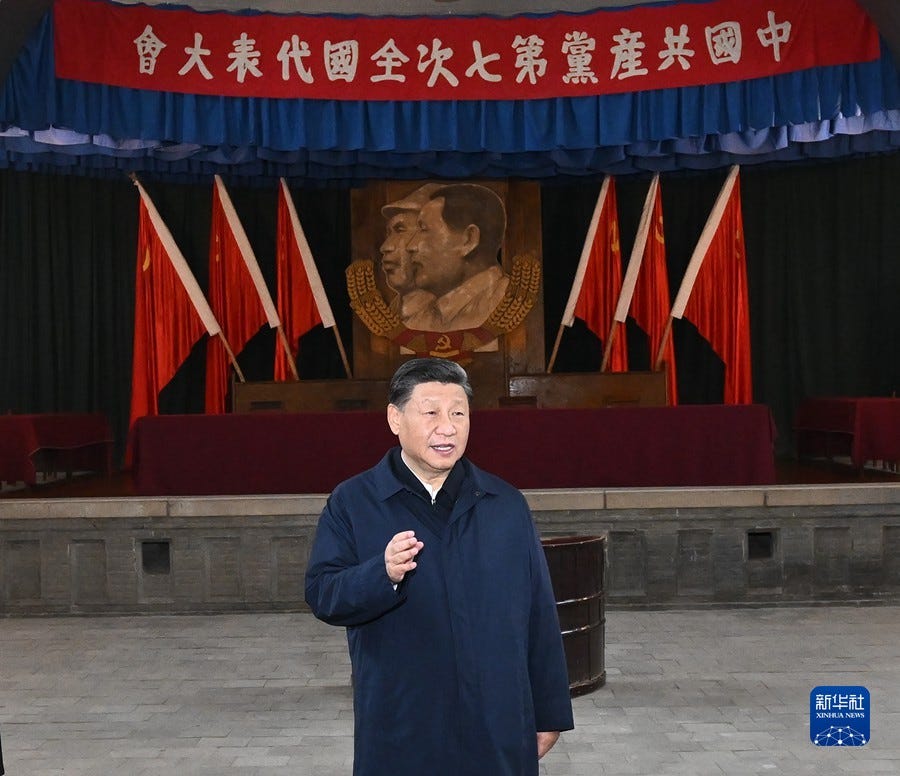
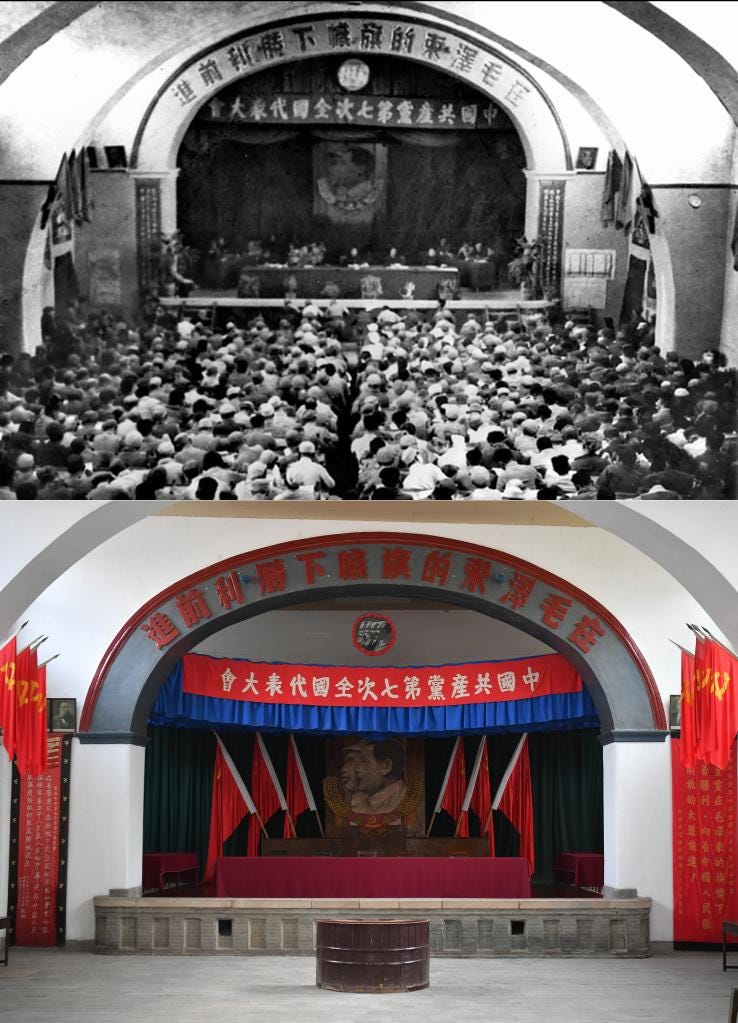
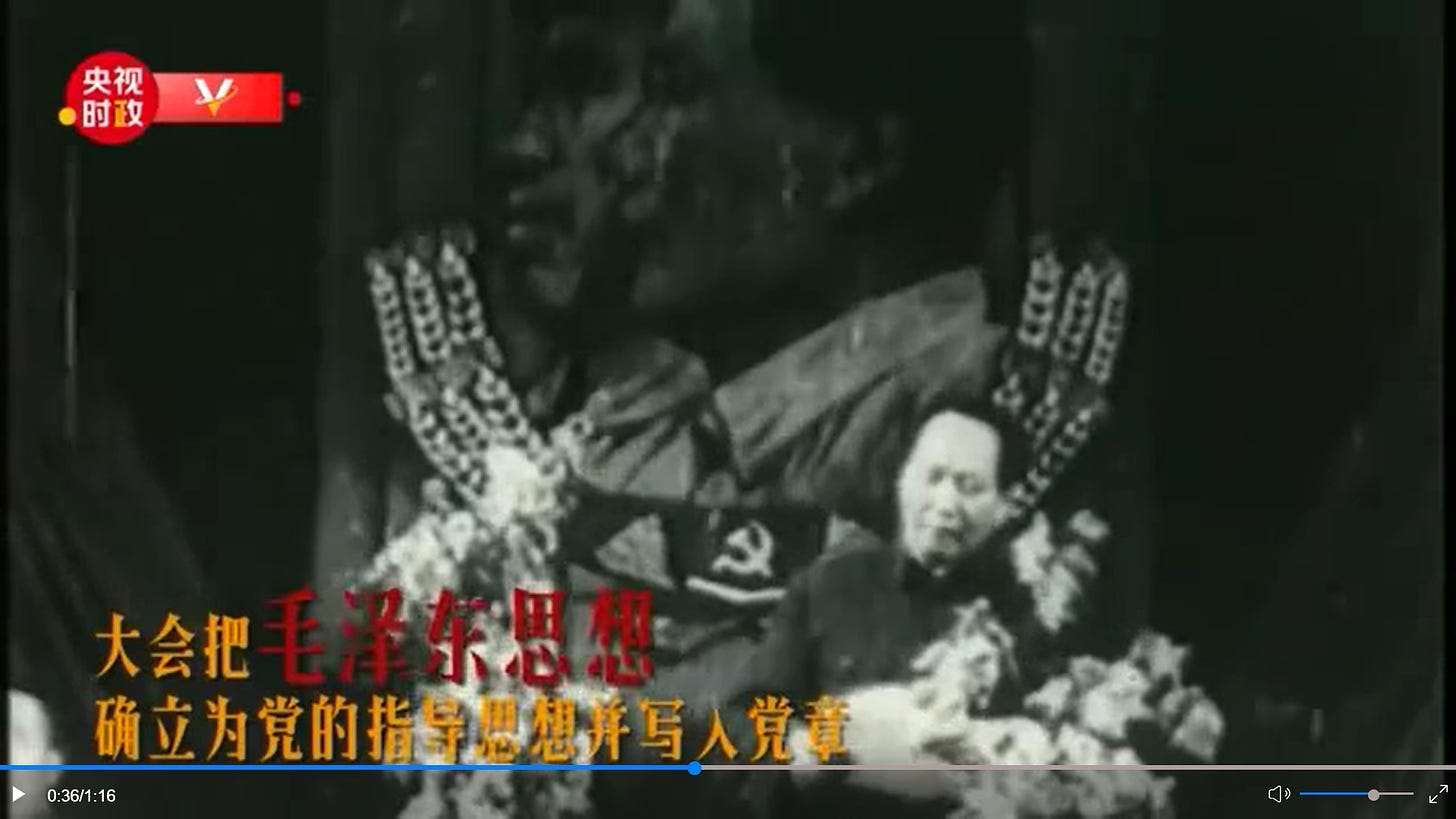
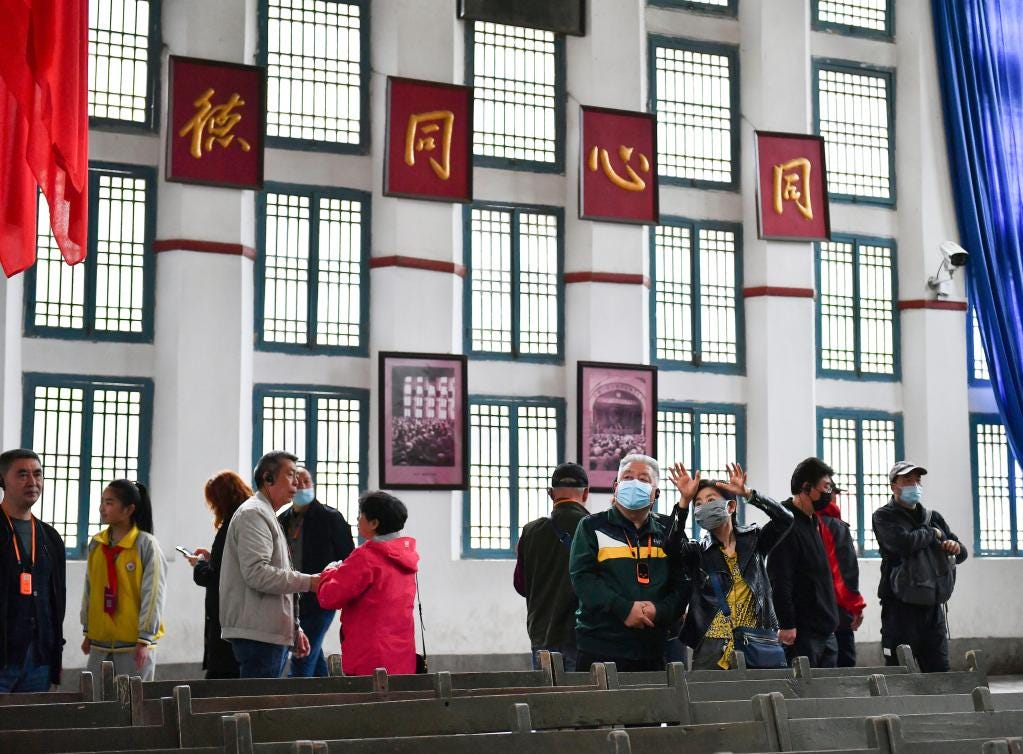

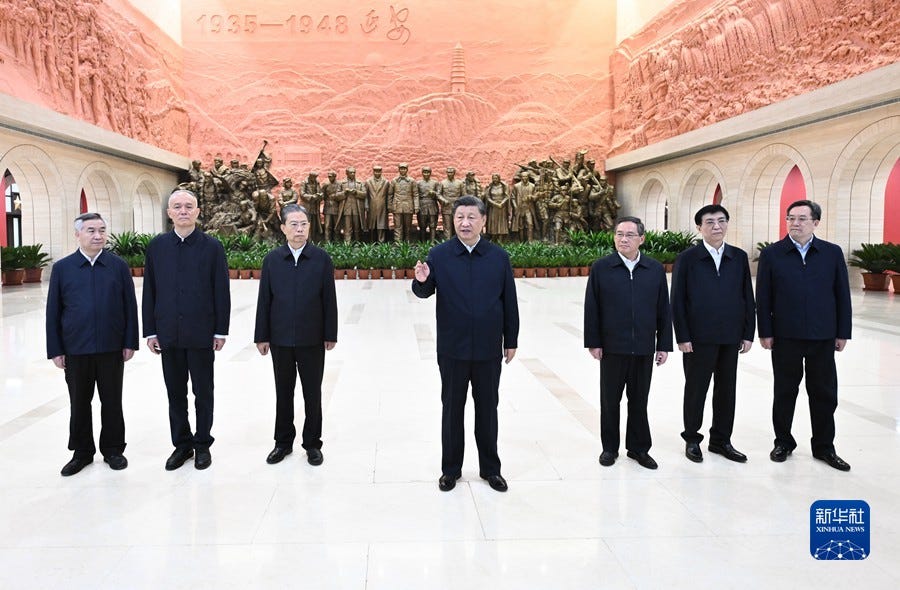
No comments:
Post a Comment